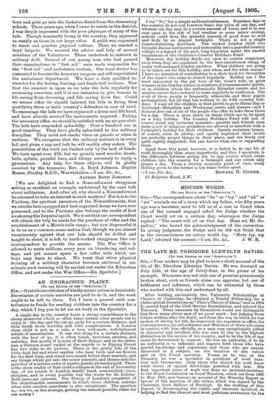[To THE EDITOR 01P THE "SPECTATOR."] Sin,—Gratuitous criticism of kindly
meant action is detestable. Secretaries of certain societies are paid to do it, and the work ought to be left to them. Yet I have a quarrel with con- tributors to funds for sending children into the country for a day, which I beg you to let me set forth in the Spectator.
A single day in the country bears a strong resemblance to the cheap motor-car which so often takes certain other people out to enjoy it : the day and the car go gaily for a certain distance, and then break down horribly and with complications. A London slum child is not, as a rule, a very well-made, well-balanced article of manufacture. It can riot along for a certain distance with the best of us; it is often tough, nerveless, careless, and untiring. But mostly it is none of these things ; and in the latter case a thirteen hours' racket at the seaside or in Epping Forest has two sides to its picture. There is the pretty tale of the little dock lad and street maiden who hear birds and see flowers for the first time, and stand awe-struck before their marvels, and say things which get into the comic journals, and thence into the speeches of a certain order of namby-pamby philanthropist There is the stern reality of that child's collapse at the end of its country day, of its return to London deadly tired, over-excited, cross, sleepless, and in every possible way the worse for its holiday. Both cases are extreme. The Bishop of London's complaint of the objectionable amusements in which these children indulge when with careless guardians is also exceptional. The question is,—are we, on the average, getting the utmost possible value for our money ? I say "No," for a simple arithmeticalireason. Fourteen days in the country do not cost fourteen times the price of one day, and whereas one day may do a certain amount of harm, and is in any case open to the risk of bad weather or some minor mishap, nobody could deny the splendid amount of good done to soul and body by an August fortnight. There is not a single counterbalancing drawback. The wicked London child who brought disease and insects and immorality into a peaceful country village is a legend of the past, long forgotten under the careful regulations of the Children's Country Holidays Fund. Moreover, day holiday funds are open to certain suspicions, even when they are organised by the best-intentioned clergy of really well-managed London parishes. What children are going to be taken out for this holiday, and when, and for what reason ? I have no intention of contributing to a choir treat for favourites of the vicar's who come to church regularly. Neither am I the least interested in the pet boys of the vicar's wife, in prize winners at the Sunday-school, in members of Communicants' guilds, or in children whom the enthusiastic Ritualist curate and his mission-sisters have induced to come regularly to confession. The work of these people is frequently admirable, and their pupils archangelical, but all that has nothing to do with country holi- days. I want all the children in that parish to go to Herne Bay or Southend—.Ritualists and Wesleyans, saints and sinners —and I distrust five out of six of the people who offer to take them there for a day. There is more check on funds which are to be spent on a long holiday. The Country Holidays Fund will not, of course, stand any sectarian nonsense ; parents and friends soon make a row if religious prejudices are allowed to interfere with a fortnight's holiday for their children. Openly sectarian homes, of course, exist in plenty, and openly organised choir treats are perfectly proper things in their place, and are freely and quite rightly supported; but one knows when one is supporting them.
Apart from this point, however, it is better to do one bit of work thoroughly than many imperfectly, and this, I maintain, is the difference between giving 10s. to any society which sends children into the country for a fortnight and one which only grants a day. From a strictly economic point of view, every shilling given to the former is ten times better spent.
—I am, Sir, &C., EDWARD H. COOPER,
61 Belgrave Road, S. W.






































 Previous page
Previous page